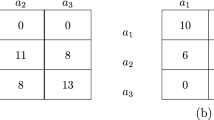Summary.
We develop an index theory for the Stationary Subgame Perfect (SSP) equilibrium set in a class of n-player \((n\ge 2)\) sequential bargaining games with probabilistic recognition rules. For games with oligarchic voting rules (a class that includes unanimity rule), we establish conditions on individual utilities that ensure that for almost all discount factors, the number of SSP equilibria is odd and the equilibrium correspondence lower-hemicontinuous. For games with general, monotonic voting rules, we show generic (in discount factors) determinacy of SSP equilibria under the restriction that the agreement space is of dimension one. For non-oligarchic voting rules and agreement spaces of higher finite dimension, we establish generic determinacy for the subset of SSP equilibria in pure strategies. The analysis also extends to the case of fixed delay costs. Lastly, we provide a sufficient condition for uniqueness of SSP equilibrium in oligarchic games.
Similar content being viewed by others
Author information
Authors and Affiliations
Corresponding author
Additional information
Received: 13 May 2004, Revised: 1 March 2005,
JEL Classification Numbers:
C62, C72, C78.
I thank John Duggan and participants of the 2003 annual meeting of the American Political Science Association, Philadelphia, PA, the Political Economy Seminar at Northwestern University, and the Economic Theory seminar at the University of Rochester for helpful comments.
Rights and permissions
About this article
Cite this article
Kalandrakis, T. Regularity of pure strategy equilibrium points in a class of bargaining games. Economic Theory 28, 309–329 (2006). https://doi.org/10.1007/s00199-005-0620-y
Issue Date:
DOI: https://doi.org/10.1007/s00199-005-0620-y




